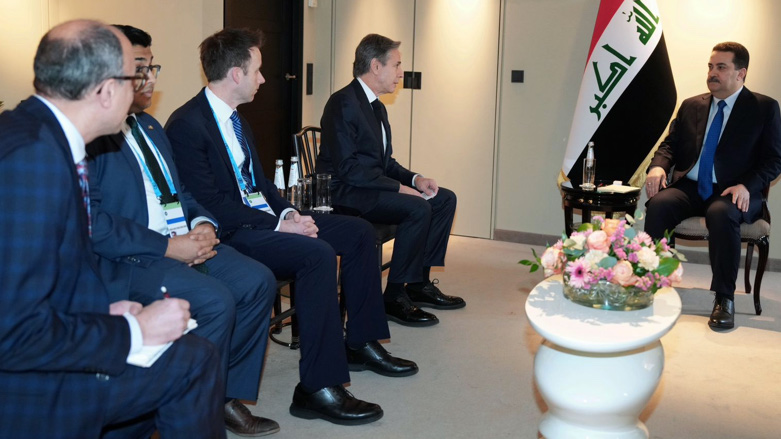Blinken, Sudani meet in Munich, where focus is Ukraine—and Russia, Iran not invited
Blinken’s meeting with Sudani came as the US and its European partners have adopted a much tougher line toward Iran, in large part because of Tehran’s support for Russia in that war.

WASHINGTON DC, United States (Kurdistan 24) — US Secretary of State Antony Blinken and Iraq’s new Prime Minister, Mohammed Shia al-Sudani, met on Saturday on the sidelines of the Munich Security Conference, which convened for the first time in many years without official Russian or Iranian representation.
Strategic Context: Growing Pariah Status of Russia, Iran
As the war in Ukraine approaches its first anniversary—on Feb. 24—Russia’s unprovoked assault on its much smaller neighbor is the top national security concern of the US and Europe, and it was the focus of this year’s Munich Security Conference.
Blinken’s meeting with Sudani—the first between a senior US official and Iraq’s new prime minister—came as the US and its European partners have adopted a much tougher line toward Iran, in large part because of Tehran’s support for Russia in that war.
Read More: Iran preparing to receive advanced Russian jets; reflects closer ties, driven by Ukraine war—report
Indeed, Blinken met with his E-3 counterparts—the British, French, and German Foreign Ministers— on the sidelines of the conference to discuss Iran. Afterwards, they issued a strongly critical statement.
In that statement, the four countries expressed their concern about three issues:
(1) Iran’s “nuclear escalation” and its failure to cooperate with the International Atomic Energy Agency;
(2) “the deepening two-way military cooperation between Iran and Russia;” and
(3) the regime’s “continued egregious human rights abuses.”
The increasing tensions between the Western powers and Iran put Baghdad in an awkward position, because of Iran’s strong influence within Iraq. Baghdad tries to straddle the differences between the two sides and offend neither party, but the result can be an incoherent posture that fails to address key problems.
Blinken’s Meetings with Senior Iraqi Officials
The meeting between Blinken and Sudani comes after the visit of Iraqi Foreign Minister Fuad Hussein last week to Washington, where he met with Blinken.
Read More: US, Iraq hail ties, following Foreign Minister’s visit
Blinken also met on Saturday at the Munich conference with the President of the Kurdistan Region, Nechirvan Barzani, marking three high level meetings that he has held with senior Iraqi officials in less than a week.
Read More: US Secretary of State meets President of Kurdistan Region on sidelines of Munich Conference
As the Biden administration soured on Iran for its support of Russia in the war in Ukraine and its human rights abuses, Washington became more active in countering malign Iranian activities, including its exploitation of Iraq’s banking system to circumvent sanctions.
That was the primary topic in Fuad Hussein’s visit to Washington, and it emerged, again, in Blinken’s meeting with Sudani.
Blinken “expressed readiness to support the Prime Minister’s efforts to stabilize and grow Iraq’s economy, including combatting corruption and money laundering.”
The corruption—of Iraqi officials—is linked to the money laundering—by Iran. The former facilitates the latter, as John Hannah, Vice President Dick Cheney’s National Security Adviser, and Joel Rayburn, former Special Envoy to Syria, recently explained.
Blinken and Sudani also discussed “economic opportunities and cooperation in the field of energy and addressing climate challenges,” the US summary stated.
Finally, “recognizing that the fight against ISIS is not yet over,” the two sides “renewed their mutual commitment to regional security and the enduring defeat of the terrorist organization,” the summary affirmed.